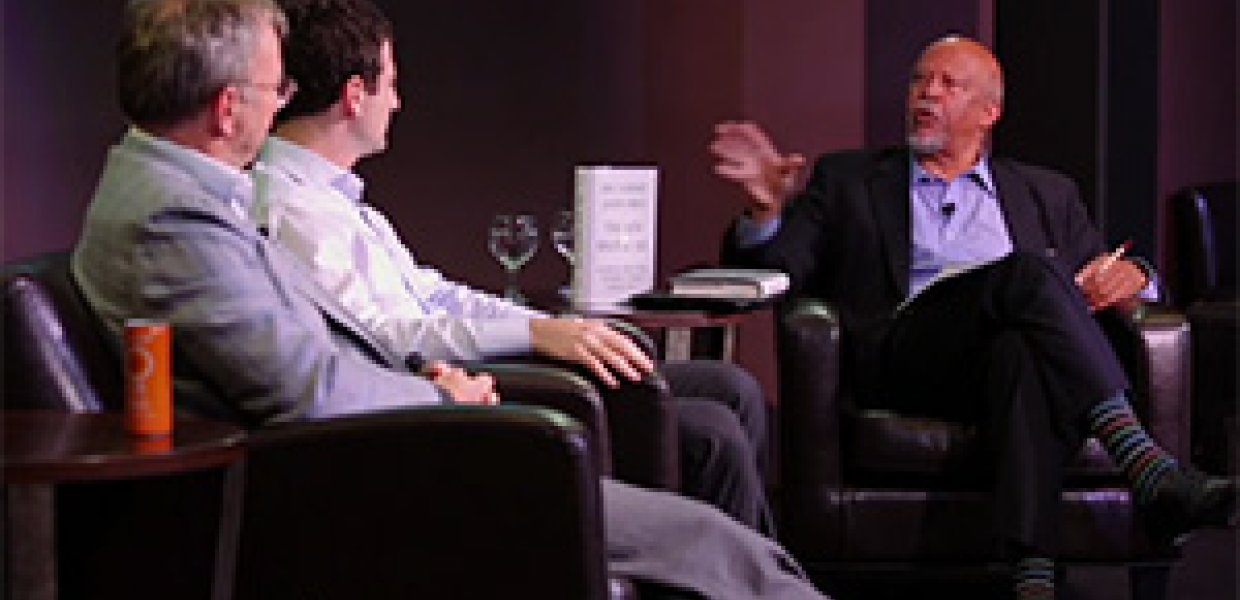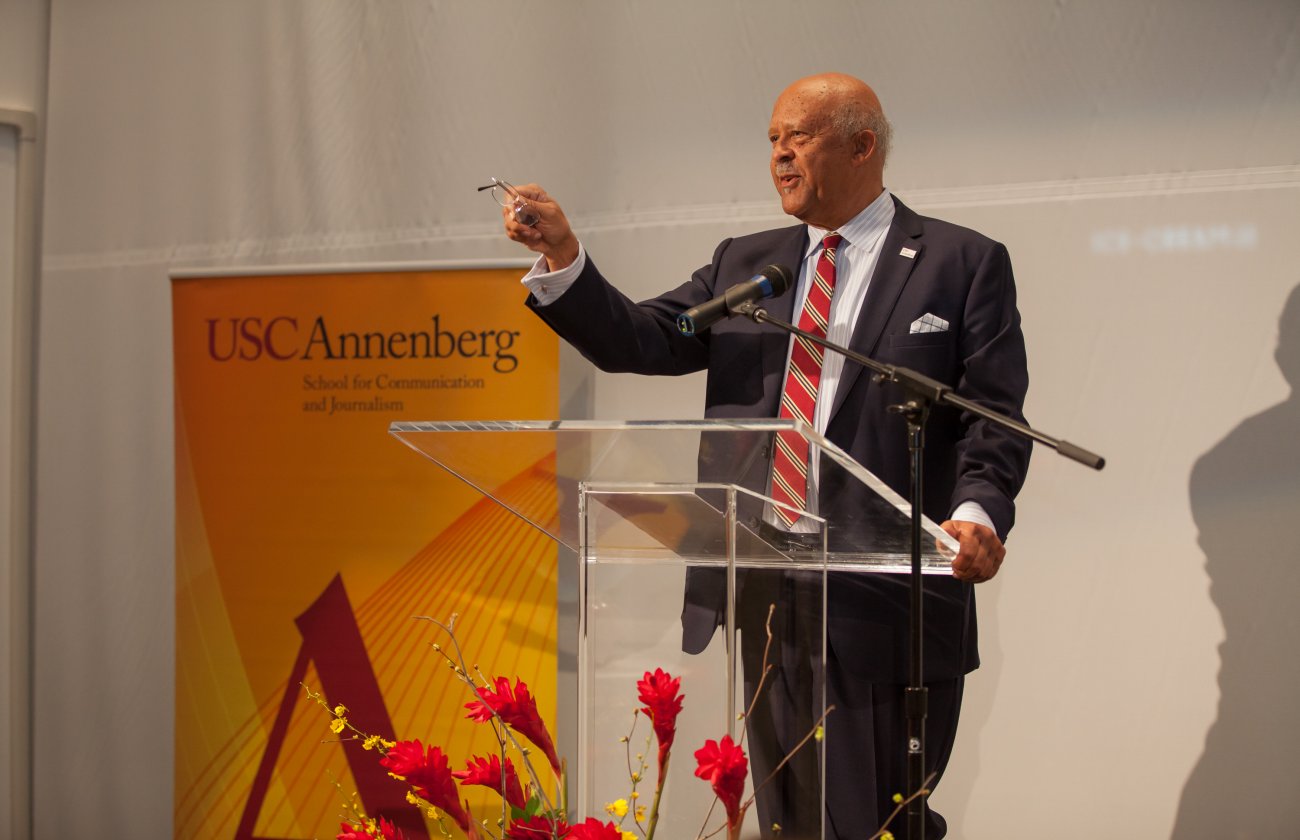 On May 9, Dean Ernest J. Wilson III moderated the Google LA Speaker Series featuring Executive Chairman of Google Eric Schmidt and Director of Google Ideas Jared Cohen, who together wrote The New Digital Age: Reshaping the Future of People, Nations and Business. The discussion, which has received more than 20,000 views on YouTube since May 16, focused on the topics Schmidt and Cohen explored in The New Digital Age including the transformative form of technology and the varying affects said technology will have on the top, middle and bottom tiers of societies around the world. According to Schmidt, “In the next five to 10 years another 5 billion people are going to join the internet. These are people from a lot of countries that we have not visited and this will be transformative on them in a way that [we] cannot imagine. They are going to go from abject poverty…to the world’s information in their own language.” “The narrative of this book in a lot of respects,” explained Cohen, “was…traveling to 30 plus countries to meet these future users to understand some of the challenges they are encountering with or without technology.” Dean Wilson asked the pair how they thought to differentiate between the before mentioned three groups of society and what the impact the connectivity of technology will be on people in countries like Rwanda and Nigeria. The two cited examples from their book of ways people in countries experiencing political unrest are using technology to their benefit. One example in particular was the benefits of Google Maps in Libya. The technology that American college students use to find the nearest Yogurtland helped Libyan school girls during the NATO bombing in the anti Gaddafi campaign map out where the bombing was taking place so they could find safe routes to school. Schmidt and Cohen discussed their collaboration over the past few years and talked about what insights and perspectives each brought to the work. “All collaborations have different viewpoints,” started Schmidt. “Jared brought an enormous understanding of foreign policy.” “There is not a single person that could have written this book on his own,” finished Cohen. “You need two types of expertise in order to look ten years into the future when everybody is connected.” To conclude his questions, Wilson pointed out his task as Dean of the Annenberg School to educate the next generation of people who will be living in our increasingly connected world and asked what competencies and skills Schmidt and Cohen look for when hiring for Google. “Experience is overrated,” Schmidt said. “Quickness and judgment are underrated because the environment is changing all the time.” “Because people in younger generations use (technology) every day, they don’t view it as an innate expertise that older generations don’t have. Their comparative advantage is knowing more about technology than the people that employ them,” explained Cohen. “The opportunity to leverage that comparative advantage to excel, introduce and inject into these ecosystems a notion of reverse mentorship is ultimately how they will break through the hierarchies and change the game.” Schmidt added that the problem current educational institutions face is innovation. “In order for America to meet the global challenges that we face, particularly from Asia and their commitment to education,” said Schmidt, “we have got to fix this educational issue. We have the tools now to measure outcomes and improve connectivity. It’s time for us to adopt them.” Before opening the discussion for audience questions, Dean Wilson mentioned Annenberg’s unique advantage, where the motto is, “Innovate or die.” The full video of the discussion can be found on YouTube.
On May 9, Dean Ernest J. Wilson III moderated the Google LA Speaker Series featuring Executive Chairman of Google Eric Schmidt and Director of Google Ideas Jared Cohen, who together wrote The New Digital Age: Reshaping the Future of People, Nations and Business. The discussion, which has received more than 20,000 views on YouTube since May 16, focused on the topics Schmidt and Cohen explored in The New Digital Age including the transformative form of technology and the varying affects said technology will have on the top, middle and bottom tiers of societies around the world. According to Schmidt, “In the next five to 10 years another 5 billion people are going to join the internet. These are people from a lot of countries that we have not visited and this will be transformative on them in a way that [we] cannot imagine. They are going to go from abject poverty…to the world’s information in their own language.” “The narrative of this book in a lot of respects,” explained Cohen, “was…traveling to 30 plus countries to meet these future users to understand some of the challenges they are encountering with or without technology.” Dean Wilson asked the pair how they thought to differentiate between the before mentioned three groups of society and what the impact the connectivity of technology will be on people in countries like Rwanda and Nigeria. The two cited examples from their book of ways people in countries experiencing political unrest are using technology to their benefit. One example in particular was the benefits of Google Maps in Libya. The technology that American college students use to find the nearest Yogurtland helped Libyan school girls during the NATO bombing in the anti Gaddafi campaign map out where the bombing was taking place so they could find safe routes to school. Schmidt and Cohen discussed their collaboration over the past few years and talked about what insights and perspectives each brought to the work. “All collaborations have different viewpoints,” started Schmidt. “Jared brought an enormous understanding of foreign policy.” “There is not a single person that could have written this book on his own,” finished Cohen. “You need two types of expertise in order to look ten years into the future when everybody is connected.” To conclude his questions, Wilson pointed out his task as Dean of the Annenberg School to educate the next generation of people who will be living in our increasingly connected world and asked what competencies and skills Schmidt and Cohen look for when hiring for Google. “Experience is overrated,” Schmidt said. “Quickness and judgment are underrated because the environment is changing all the time.” “Because people in younger generations use (technology) every day, they don’t view it as an innate expertise that older generations don’t have. Their comparative advantage is knowing more about technology than the people that employ them,” explained Cohen. “The opportunity to leverage that comparative advantage to excel, introduce and inject into these ecosystems a notion of reverse mentorship is ultimately how they will break through the hierarchies and change the game.” Schmidt added that the problem current educational institutions face is innovation. “In order for America to meet the global challenges that we face, particularly from Asia and their commitment to education,” said Schmidt, “we have got to fix this educational issue. We have the tools now to measure outcomes and improve connectivity. It’s time for us to adopt them.” Before opening the discussion for audience questions, Dean Wilson mentioned Annenberg’s unique advantage, where the motto is, “Innovate or die.” The full video of the discussion can be found on YouTube.
Dean Wilson Moderates Google LA Speaker Series
May 28, 2013
Updated May 4, 2023 11:35 a.m.








